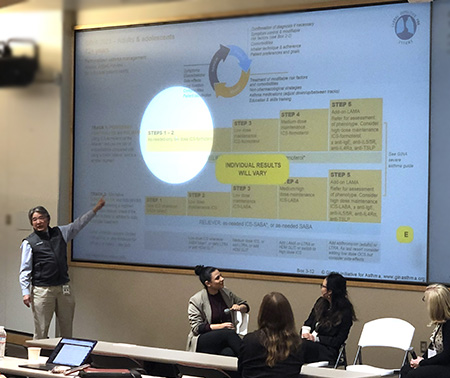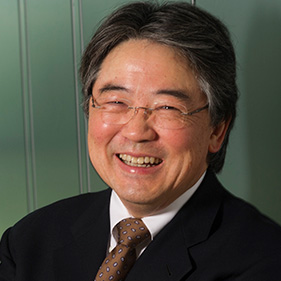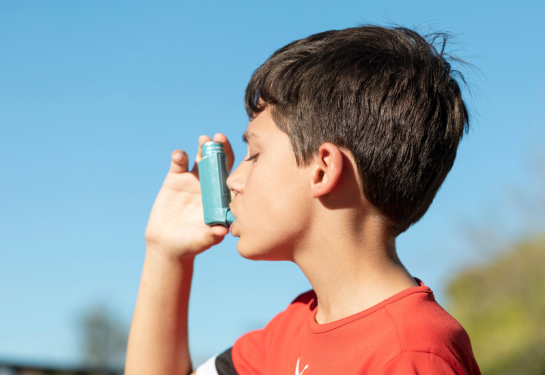UC Davis Asthma Network hosts first annual Asthma Bootcamp
Event provides patients and home healthcare guardians tips to better control their asthma
About 100 patients, caregivers and health care clinicians gathered at the UC Davis Health Education Building on Saturday for UC Davis Asthma Network’s (UCAN™) first-ever Asthma Bootcamp.
The free event, which was open to the public, educated people 12 years and older living with asthma, and their parents or home healthcare guardians on strategies to better control their chronic lung disease. The inaugural UCAN Bootcamp was made possible by a grant from Regeneron and the Dr. John “Jack” Doval endowment.

A panel of experts explained how to recognize uncontrolled asthma and how patients can advocate for themselves. Attendees learned about the progression of asthma, from assessment to treatment plans. Experts also taught important medical vocabulary — such as phenotype, atopy and eosinophils — so patients and caregivers can better communicate with their providers.
UC Davis Health pulmonologists and respiratory therapists led workshops about how to interpret an Asthma Control Test™, a tool to help control asthma. They also taught patients and home healthcare guardians how to use inhalers and helped hem create an asthma action plan.
“Asthma is a chronic condition that affects about 1 in 13 people, children and adults, in the United States,” said Samuel Louie, professor emeritus of internal medicine who founded and previously led UCAN™. “There is no cure for asthma, but a remission is definitely within every patient’s grasp. Asthma care must be patient centric. Asthma control is a marathon, not a sprint.”
What is uncontrolled asthma?
Asthma is a chronic illness that can be controlled but never truly goes away. Uncontrolled asthma refers to asthma that causes frequent symptoms, or flare-ups. This may occur because the asthma is untreated or because current treatments are insufficient.
According to the Centers for Disease Control and Prevention, 60.1% of adults with current asthma had uncontrolled asthma without even realizing it.
“Uncontrolled asthma is common,” said Sara Abu-Nasser, assistant clinical professor of pediatric pulmonology. “When uncontrolled, asthma can negatively affect your health in the long term and each symptom can affect your health in different ways.”
Some long-term effects of uncontrolled asthma include:
- Airway and lung damage
- Severe asthma exacerbations
- Disrupted sleep
- Increased risk of infection
- Pregnancy complications
- Gastroesophageal reflux disease (GERD)
- Obesity
- Complications such as osteoporosis, diabetes, infections, weight gain, anxiety and depression from repeated or chronic use of oral corticosteroids including prednisone.
“Uncontrolled asthma can develop for several reasons, including patients having trouble understanding when or how to use their inhaler treatments or receiving treatments that do not work sufficiently to control their symptoms,” explained Abu-Nasser. “That's why the education received today is so important. It will better prepare patients to control their asthma.”
There is no cure for asthma, but a remission is definitely within every patient’s grasp. Asthma care must be patient centric. Asthma control is a marathon, not a sprint.”—Samuel Louie
Bootcamp workshops
Uncontrolled asthma and poor disease control are associated with incorrect use of inhalation devices. Some studies have shown only 23-34% of patients adhere to their prescribed treatment and up to 80% of patients are using the wrong techniques for inhalers.
This is all the more important why part of the bootcamp focused on education.
“We want to ensure that everyone knows how to properly use their inhaler, which is a technique that is critical to properly treating asthma,” said Anh P. Nguyen, health sciences assistant clinical professor of pediatric allergy. “The patient, home healthcare guardians and provider should join together in an alliance to ensure proper usage and reduce the risk of asthma exacerbations.”
During one of the workshops, pulmonologists and respiratory therapists trained patients and their caregivers on the proper techniques for the many different inhalers available for asthma control and rescue.
“It’s so important that we work with the home healthcare guardians and not just the patients during this training,” explained Celeste C. Payne, prior authorization specialist at UC Davis Health. “Home healthcare guardians play a critical role in optimal management of asthma.”
About UCAN™
UCAN™ was founded in 1996 and has become a nationally recognized clinic for its excellence in integrated patient care and patient safety outcomes.
The UCAN™ Clinic includes dedicated asthma experts who exemplify the mission of the university: patient care, education and research. The team addresses the health care disparities and unmet needs in asthma patient education and patient safety for Northern California.
“Our philosophy is that we are not just treating asthma, we are treating people living with asthma,” explained Louie, the former UCAN™ director. “That’s why our message today is — you are not alone. We are here to help you control your asthma so you can live without limits.”





